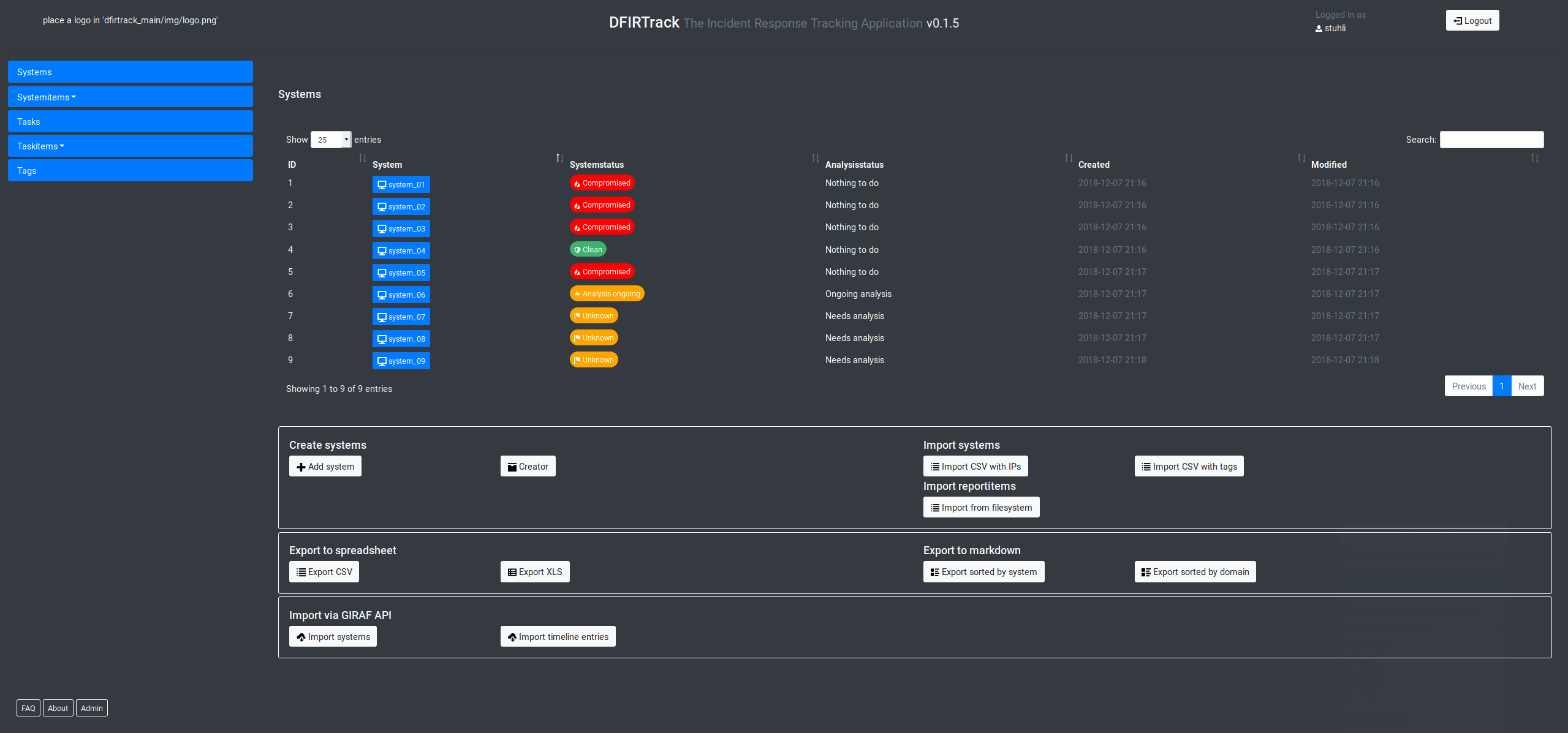DFIRTrack (Digital Forensics and Incident Response Tracking application) is an open source web application mainly based on Django using a PostgreSQL database backend.
In contrast to other great incident response tools, which are mainly case-based and support the work of CERTs, SOCs etc. in their daily business, DFIRTrack is focused on handling one major incident with a lot of affected systems as it is often observed in APT cases. It is meant to be used as a tool for dedicated incident response teams in large cases. So, of course, CERTs and SOCs may use DFIRTrack as well, but they may feel it will be more appropriate in special cases instead of every day work.
In contrast to case-based applications, DFIRTrack works in a system-based fashion. It keeps track of the status of various systems and the tasks associated with them, keeping the analyst well-informed about the status and number of affected systems at any time during the investigation phase up to the remediation phase of the incident response process.
Features
One focus is the fast and reliable import and export of systems and associated information. The goal for importing systems is to provide a fast and error-free procedure. Moreover, the goal for exporting systems and their status is to have multiple instances of documentation: for instance, detailed Markdown reports for technical staff vs. spreadsheets for non-technical audiences without redundancies and deviations in the data sets.
The following functions are implemented for now:
- Importer
- Creator (fast creation of multiple related instances via web interface) for systems and tasks,
- CSV (simple and generic CSV based import (either hostname and IP or hostname and tags combined with a web form), should fit for the export capabilities of many tools),
- Markdown for entries (one entry per system(report)).
- Exporter
- Markdown for so-called system reports (for use in a MkDocs structure),
- Spreadsheet (CSV and XLS).
A list of feature ideas is maintained in the Wiki – Roadmap.
Installation
DFIRTrack is developed for deploying on Debian or Ubuntu. Other distributions may work but were not tested yet. At the moment the project will be focused on Ubuntu LTS and Debian releases.
For fast and uncomplicated installation on a dedicated server including all dependencies an Ansible playbook and role was written (available here). For testing a docker environment was prepared (see below).
For installation with your own setup or for testing look at the Wiki – Installation.
Docker Environment
An experimental Docker Compose environment for local-only usage is provided in this project. Run the following command in the project root directory to start the environment:
docker-compose up
A user admin is already created. A password can be set with:
docker/setup_admin.sh
The application is located at localhost:8000.
Built-in software
The application was created by implementing the following libraries and code:
Bootstrap
clipboard.js
DataTables
jQuery
Open Iconic
Popper.js
Development
There are two main branches:
master
develop
The master branch should be stable (as you can expect from an alpha version). New features and changes are added to the develop branch and merged into master from time to time. Everything merged into develop should run too but might need manual changes (e. g. config). devolop branch of DFIRTrack Ansible should follow these changes. So if you want to see the latest features and progress: “check out” develop.
License
See LICENSE file in the root directory.
Disclaimer
This software is in an early alpha phase so a lot of work has to be done. Even if some basic error checking is implemented, as of now the usage of DFIRTrack mainly depends on proper handling.
DFIRTrack was not and most likely will never be intended for usage on publicly available servers. Nevertheless some basic security features were implemented (in particular in connection with the corresponding ansible role) always install DFIRTrack in a secured environment (e. g. a dedicated virtual machine or in a separated network)!
#dfirtrack #digitalforensics #incidentresponse #blackhatethicalhacking
Become a Patron!

